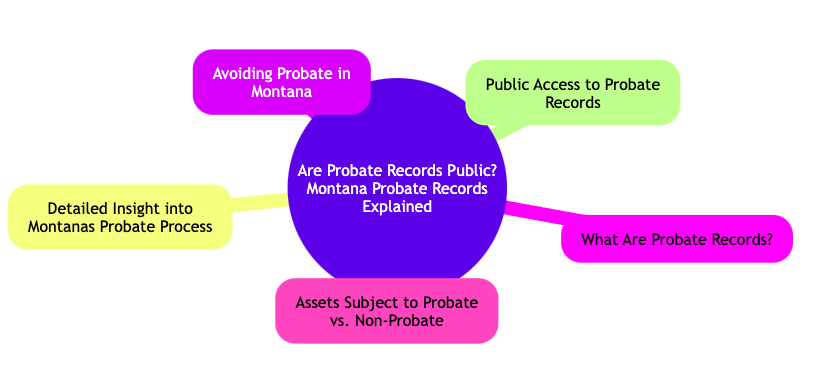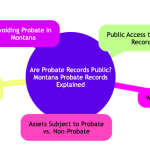What Are Probate Records?
Probate records are official documents that highlight the decisions made during the probate process. Once a deceased person’s estate is administered through a court, the probate process begins, and probate records become available for public access.
Probate records are public for accountability and traceability. The goal is to provide transparent decision-making records regarding the deceased's wishes. Sensitive information is not included for privacy.
Montana Elder Law is a trusted resource for anyone seeking the advice of an experienced Montana probate attorney. If you have any questions, we will have the answers!
Key Takeaways:
- Public Accessibility: Probate records are generally open to the public.
- Contents of Records: These documents often include the will, inventories of the estate’s assets, and court notices.
- Purpose: They help ensure the deceased's wishes are fulfilled and debts paid.
- Initial Steps: The process begins when an executor or attorney files the will and a death certificate with the probate court.
- Privacy Concerns: While public, sensitive information is often redacted to protect the privacy of the parties involved.

Insights into Montana's Probate Process
How Probate Works in Montana
Probate in Montana starts when someone files the deceased’s will with the local court.
This filing is usually accompanied by a petition for probate, which formally requests the court to begin the process.
The court then issues a notice to heirs and creditors, marking the beginning of asset distribution and debt settlement.
Legal officials generate and file various documents throughout the process, which become part of the probate records.
This sequence satisfies all legal requirements and settles the estate fairly according to the deceased's wishes.
Assets Typically Subject to Probate
In Montana, certain assets inevitably go through probate unless arrangements like trusts or joint ownerships are in place. These typically include:
- Real Estate: Property solely owned by the deceased.
- Personal Property: Items like vehicles, jewelry, and art.
- Bank Accounts: Solely owned accounts without a payable-on-death designation.
- Investments: Stocks and bonds held individually by the deceased.
Assets Subject to Probate vs. Non-Probate
|
Asset Type |
Subject to Probate? |
Notes |
|
Real Estate |
Yes |
Unless jointly owned with rights of survivorship |
|
Personal Vehicles |
Yes |
If only in the deceased’s name |
|
Bank Accounts |
Yes |
Unless there are designated beneficiaries |
|
Life Insurance |
No |
Proceeds go directly to named beneficiaries |
|
Retirement Accounts |
No |
Typically bypass probate if a beneficiary is named |
Are Probate Records Public in Montana?
Montana's probate records provide a transparent view into the estate distribution process, openly listing details like wills, lists of beneficiaries, and how assets are allocated. For anyone researching family history or legal matters, these records are invaluable.
- Wills: Including last wishes and instructions for asset distribution.
- Beneficiary Names: Identifies who inherits and what they are entitled to.
- Asset Lists: Detailed rundowns of property, financial accounts, and personal items.
- Court Filings and Orders: Official documents that outline the court's decisions and directives.
- Final Accounting: A financial statement that details the estate's financial activities.
Limitations and Privacy Concerns
While probate records are public, they are not unfettered.
The legal system strives to upload personal privacy while providing transparency.
Sensitive information, such as social security numbers and minor children's identities, is often redacted to prevent misuse.
Moreover, certain records can be sealed under specific conditions (e.g., To protect an estate's confidential business details or during a pending court case).
Knowing when and how these exceptions apply helps one understand the balance between public interest and private rights.
Avoiding Probate in Montana
Legal Strategies to Bypass Probate
Montana offers several legal avenues to sidestep the probate process, each providing a pathway to distribute assets smoothly and privately.
Using Trusts
Creating a trust can shield your estate from the public eye of probate. Assets placed in a trust are transferred directly to beneficiaries without court interference, maintaining privacy and reducing administrative overhead.
Joint Ownership
Properties held in joint tenancy or with survivorship rights automatically pass to the surviving owner(s), never entering probate.
Designated Beneficiaries
Accounts like life insurance, IRAs, and 401(k)s allow owners to name beneficiaries who will receive assets directly upon the account holder's death.
The Role of Estate Planning
Comprehensive estate planning means your assets are protected and smoothly transferred to your loved ones.
Working with a knowledgeable elder law attorney can help you craft a plan that meets your specific needs and goals, potentially avoiding the complexities of probate.
Using tools like trusts, enhanced beneficiary designations, and proper asset titling, an attorney can help streamline the estate distribution process, making it easier for everyone involved.
Montana Probate Records Made Simple - Montana Elder Law
Montana's probate records offer a transparent view into the estate distribution process after someone passes away.
These records are public, making them accessible for legal scrutiny and personal inquiries.
Probate records include crucial documents such as wills, estate inventories, and court rulings. By providing a clear record of asset distribution and executor actions, they play a vital role in upholding the legal process and guaranteeing that all parties' rights are respected.
Montana Elder Law is dedicated to providing sound legal guidance on estate planning and probate.
With a deep understanding of local laws, we provide tailored advice that minimizes the stress of probate proceedings. Come and introduce yourself to our expert Montana Elder Law attorneys. We are part of the communities we serve; when we tell you we care, we mean it. Our mission is to protect the lives and legacies of Montana’s Seniors (and their families).





